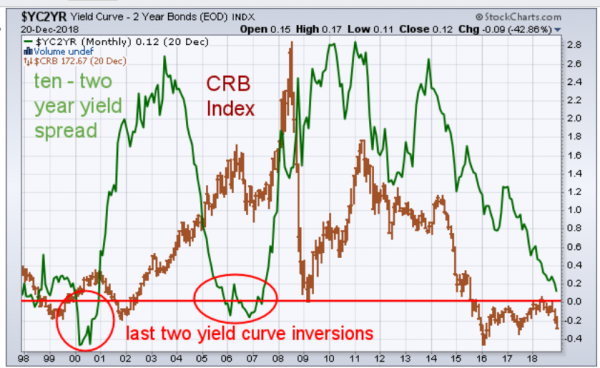

Wow, this has been a dreadful month for the stockmarket in general and our portfolio companies in particular. There is a tremendous amount of fear in the markets right now. Some of it is justified but some of it is irrational. The question than becomes what are we to do?
I have been emailed and tweeted at by people wondering if this is a stock market crash and should they sell or if this is a buying opportunity and they should look to pick up bargains.
The first thing I have to say is that I am not a market timer. I have no clue when markets are at tops or bottoms. I look for assets, stocks, industries, countries and commodities that are bombed out and that have a catalyst to turn around.
This is a contrarian philosophy that has generally worked for me in the past. I suspect it will work in the future also, irrespective of what the general market is doing.
That does mean I ignore what is happening. The FED is simultaneously raising interest rates and running off its balance sheet at a $50 billion/month clip. This is unprecedented and it is causing unforeseen consequences for many markets and consternation among investors as this has never been done before.
I am of the view that the perception in the market is that liquidity is being withdrawn and people are selling now to avoid the inevitable recession and stock bear market they think is coming. Whether we have a bear market, or the economy goes into recession does not matter. People are scared and are just selling to avoid losses.
Speaking of bear markets. If you define a bear market as a decline of 20% or more than we are in one already.
The markets are also tremendously oversold, and we should expect a rebound in stock prices soon. Expect continued volatility. If you are worried about the economy and future stock market returns due to the possibility of a recession and/or stockmarket crash and want to sell you should look to sell into these rallies.

Commodities are currently getting shellacked as liquidity is drained from the system. The current situation is a bit unprecedented as typically the FED raises rates because inflation is a threat. This means that commodities are usually near a high as the FED raises rates.

You will note that the last two times the yield curve became inverted (circled in red) the CRB commodities index was at near term high. As the FED continues to raise short term interest rates the yield curve is again in danger of becoming inverted which typically precedes a recession which in turn leads to less commodity demand and eventual commodity price declines.
This is the FED and central bank-controlled world we live in. Nobody talks about economics, company results, and actual meaningful economic statistics. Everybody seems to be focused on what the FED will do next. All kinds of experts are being trotted out to give opinions on what will happen next.
It seems that the FED will continue to raise rates until they break the economy or stock market (maybe they have already). The problem is that there is tremendous amount of debt in the world-wide system, quite a bit of it denominated in US dollars. As rates are raised the dollar is pressured higher.
This causes foreign companies and governments who are encumbered with dollar denominated debt to come under pressure. The rise in the dollar makes it more expensive for foreign borrowers to pay back current debt. If your company borrowed in dollars but earns money in a currency like kyat, hryvnia, or zloty it takes more of those currency units to pay your debt in dollars. That puts your business under pressure and weak companies can default on their debt.
Not only are interest rates higher making it costlier to refinance, the ability to refinance comes into question as lenders start to tighten credit as the above pressures begin to manifest inside companies.
The current situation is that debt has expanded well in excess of the ability to service it if rates continue rising. This situation was enabled by a decade of zero interest rate policy promulgated by the worlds central banks as a response to the 2008 Global Financial Crisis.
The problem with zero rates is that free money does five negative things.
- It allows zombie companies that are not economically viable to continue to survive on a diet of low interest debt financing.
- Free money allows all types of non-economic decisions to be made i.e. the fracking boom in the US, bitcoin speculative bubble, new real estate bubble (Canada, Australia, parts of the US).
- Encourages companies to borrow money and buy back their own stock. This has been one of the major reasons the stock market became overvalued.
- Forces everyone shift from an investor mentality to a speculator mentality.
- Allows irresponsible governments to spend money they do not have. If central banks are buying all of countries debt (Japan and increasingly the EU) than rates are forced to zero. In the past rising rates and the market (the bond vigilantes) were able to enforce discipline by selling government bonds and forcing up interest rates.
There is huge amount of risk out there because as the central banks now begin to tighten liquidity, we could see all the weak links in the world financial chain get tested. I suspect that several of them will break and create huge losses but also potential opportunities for those that understand who, what, and where.
A recent Washington Post article ,which you may want to read, sums up the problem. The risk to these bonds is explained in the article.
From the article:
One area of concern is the share of bonds rated BBB now takes up around half of the more than $5 trillion market for investment-grade corporate debt. Arguably, businesses with the most robust balance sheets sport investment-grade credit ratings, but BBB-graded bonds sit only one to three notches above so-called junk, or sub-investment grade, debt. If credit ratings firms do downgrade much of this tranche of debt into “junk” during the next recession, some conservative investors like pension funds and insurance companies may have to dump their holdings, sparking a wave of forced selling and seizing up the high-yield market.
The problem here is that many companies that should not have been able to borrow money as their business sucks and liquidated by market forces. This market cleansing mechanism was interrupted by a decade of basically free money.
(skip)
But with $3.5 trillion of bonds expected to come due in the next three years from high-yield and investment-grade issuers, the so-called maturity wall, firms may have to roll over their debts when interest rates are much higher, or even during a recession.
That’s the problem isn’t it. There is a good chance that we see a recession in the next couple of years, if not later in 2019. If a recession hits and cashflows become constrained at these crappy companies how will they make their interest payments much less roll their debt?
The bond market is not like the stock market. Most of you are familiar with how easy it is to buy or sell a stock. You can pretty much do it from you phone in seconds.
That is not how bonds are traded. You normally must talk to a broker and tell him what you are looking for and what you will pay. He then must call around and try and find someone who has these bonds and is willing to sell for the price you are willing to pay. It is not easy to trade corporate bonds.
What happens if the economy enters recession and the “BBB” rated bonds begin to get downgraded to junk bond status?
As the article points out many pension funds, insurance companies, and ETF’s are not allowed to hold junk bonds in their portfolios. When and if these bonds get downgraded than we have all these institutions trying to sell bonds at the same time.
Trying to sell bonds into an illiquid market to who exactly? If institutions are not there to buy these bonds who is going to buy them? What will happen to the price of these bonds?
I suspect they will crash to a level where someone will come in and buy them, probably vulture funds and private equity funds. They will become extremely cheap and the yields will be very high. Remember when a bonds price goes down the interest rate goes up and vice versa. Here is an article that explains this concept.
Not all these companies will go bankrupt so we will have an excellent opportunity (once in a lifetime?) to buy cheap bonds of the surviving companies.
In the most recent issue of the Actionable Intelligence Report I detail how we are playing this trend on the downside and setting up for the bargains of a generation.
Interested in knowing how I make huge profits in the financial markets? Try a subscription to my paid newsletter “Actionable Intelligence Alert”. You can check it out by going to:
actionableintelligencealert.com/subscribe
I have started up a Patreon account for those that wish to help support my work. Check it out here:
https://www.patreon.com/JohnPolomny
If you pledge at least $5.00 I will send you the current months stock pick. This way you can sample the “Actionable Intelligence Alert” newsletter and see if it is for you.





